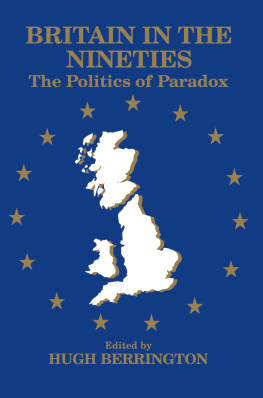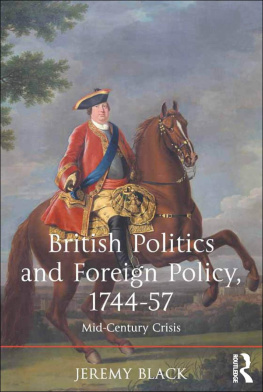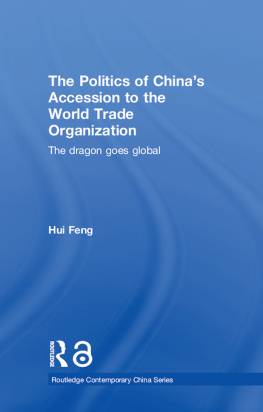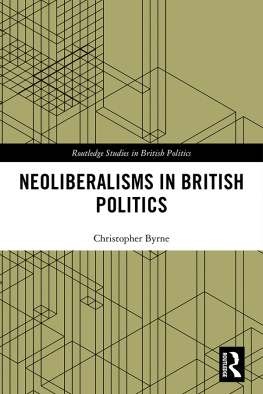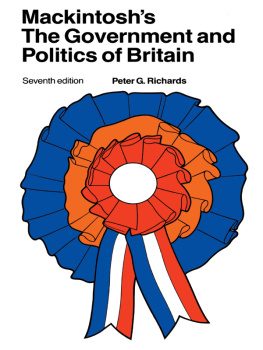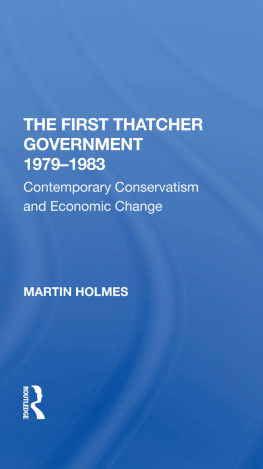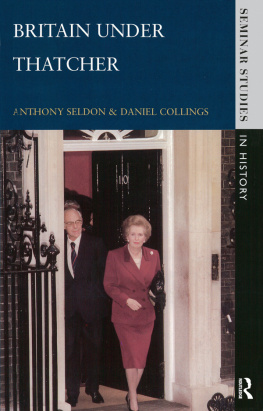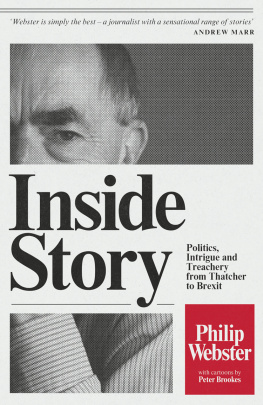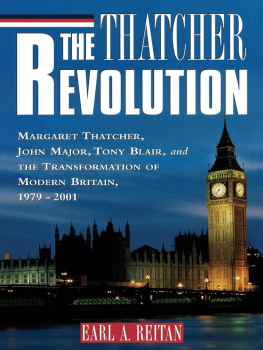First Published in 1998 in Great Britain by
Routledge
2 Park Square, Milton Park, Abingdon, Oxon, OX14 4RN
270 Madison Ave, New York NY 10016
Transferred to Digital Printing 2006
Website: http://www.routledge.com
Copyright 1998 Routledge Publishers
British Library Cataloguing in Publication Data:
Britain in the nineties : the politics of paradox
1. Political parties Great Britain. 2. Great Britain Politics and government 1979
I. Bemngton, Hugh B. (Hugh Bayard), 1928 II. West European politics journal
320.94109049
ISBN 0-7146-4880-9 (cloth)
ISBN 0-7146-4434-X (paper)
Library of Congress Cataloging-in-Publication Data:
Britain in the nineties : the politics of paradox / edited by Hugh Bemngton.
p. cm.
Includes bibliographical references and index.
ISBN 0-7146-4880-9. ISBN 0-7146-4434-X (pbk.)
1. Great BritainPolitics and government19791997. 2. Great BritainPolitics and government1997- I. Bemngton, Hugh.
DA592.B7415 1998
320.94109049dc21
98-16038
CIP
This group of studies first appeared in a Special Issue on Britain in the Nineties: The Politics of Paradox of West European Politics, (ISSN 0140-2382) 21/1 (Jan. 1998) published by Routledge.
All rights reserved. No part of this publication may be reproduced in any form or by any means, electronic, mechanical, photocopying, recording or otherwise, without the prior permission of Routledge and Company Limited.
Publishers Note
The publisher has gone to great lengths to ensure the quality of this reprint but points out that some imperfections in the original may be apparent
HUGH BERRINGTON
The orator bustled up to him, and drawing him partly aside, inquired On which side he voted? Rip stared in vacant stupidity. Another short but busy little fellow pulled him by the arm, and, rising on tiptoe, inquired in his ear, Whether he was Federal or Democrat?
Alas! gentlemen, cried Rip, somewhat dismayed, I am a poor quiet man, a native of the place, and a loyal subject of the King, God bless him!
Here a general shout burst from the bystanders A tory! A tory! hustle him! away with him!
Washington Irving, Rip van Winkle (1820)1
The original Rip van Winkle went to sleep a few years before the American War of Independence, and awoke 20 years later to find when he returned to his village, that he recognised none of the inhabitants, that his wife was dead and his house in decay. The Union Hotel had replaced the old village inn; the sign that had borne the picture of King George III was still there, but though it still bore the face of the King, a sword had taken the place of the sceptre; the head had a cocked hat and the sign was labelled General Washington. Near to where the inn had stood was a flagpole, bearing the stars and stripes.
A modern Rip van Winkle, who went to sleep at the beginning of May, 1979 and awoke 18 years later, with just a short interlude of wakefulness in the summer of 1983, would have suffered the same kind of shock and endured the same bewilderment. He would have recalled the manifesto declarations on Europe in the two elections of 1974: Labour promising that it would immediately seek a fundamental renegotiation of the terms of entry and the Conservatives asserting that Europe gives us the opportunity to reverse our political and economic decline. It may be our last.2 On waking, he would have seen the growing rift between the Conservative Party and big business, a division unprecedented in this century, on the very issue of Europe.
Before drifting off to sleep, he would have been aware of the rising turmoil within Labour, as its activists strove to seize hold of the levers of power; and he would have observed of the Conservative Party, that its one major, formal constitutional change since 1918 the election of the leader by the MPs had not yet revealed its full potential.
Had he awoken briefly in June 1983, before going back to sleep, his surprise on his final awakening in May 1997 would have been even more acute. He would have seen Labour go to the country in 1983 calling for Britains immediate withdrawal from Europe, and its share of the poll reduced to 28 per cent, its lowest figure since 1918. He would have learned that the election of the Labour Party leader had been taken out of the hands of MPs and lodged with an electoral college.
As the rest of us adapt insensibly to change, it is only a Rip van Winkle who can savour fully the piquant smell of paradox. The contributions in this volume aim to explore in greater depth some of the paradoxes and contradictions of the last 20 years and their legacy for the present decade.
THE DISTRIBUTION OF POWER IN THE BRITISH PARTIES
Labours turmoil, which began in the late 1970s, seemed like an epitaph on the work of the late Robert McKenzie. As Dennis Kavanagh shows in his absorbing review of the subject, McKenzies seminal text, British Political Parties3 first published in 1955, soon became the authoritative text for analysts of power within the two major parties. The distribution of power in the Labour Party had gradually come to resemble that in the Conservative Party, with Labours democratic claims being slowly but remorsely challenged by what, for McKenzie, was an ineluctable process. The rift between the Labour government and the trade unions in the first Wilson government, however, posed serious doubts about the viability of the McKenzie thesis; the breakdown of the relationship between unions and government in the second Wilson and Callaghan governments, and the mobilisation of the constituency parties seemed fatally to undermine the thesis. Indeed, to many observers, the demands for constitutional change within the party seemed to pose a threat to the liberal democratic polity itself.
The changes proposed for the election of the party leader transferred the choice of prime minister from MPs to an electoral college in which they would have only 30 per cent of the votes. A larger share would be held by the trade unions, with the casting of those votes often influenced by horse-trading, and the balance by the constituency parties, often regarded as self-appointed, unrepresentative, remote from day-to-day experience of government and representative of opinion at the extreme of the political spectrum; the power to choose the prime minister would be placed firmly outside the House of Commons. Moreover, in government, the mechanisms to bring about the dismissal of the prime minister could be invoked by a two-thirds majority at the party conference. The changes in the Labour Party seemed to push the the constitution to the extra-parliamentary zone; the chain that linked the citizen, the House of Commons and the government would be broken.
Even at the time, such fears were crudely alarmist; in Canada, for example, party leaders are chosen by party conventions, whose members for the most part come from outside the House of Commons.4 Similarly, in Germany the party leaders, appointed to head their parties during the election campaign are chosen by the party organisations outside the Bundestag. None of the consequences foreshadowed for Britain have occurred. Indeed, the remarkable feature of the last 15 years has been the ease with which the new formula for electing the Labour leader has been absorbed into normal constitutional practice.

